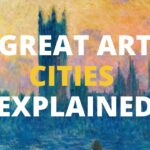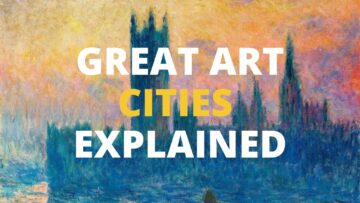Great Art Cities: Visit the Fascinating, Lesser-Known Museums of London & Paris


Gallerists James Payne and Joanne Shurvell understand that institutional big gorillas like the Louvre, the Musee d’Orsay, Tate Britain, and London’s National Gallery require no introduction. Their new art and travel series, Great Art Cities Explained, concentrates instead on the wonderful, smaller museums the biggies often overshadow.
First time visitors to London and Paris may be left scrambling to rearrange their itineraries.
The first two episodes have us persuaded that Sir John Soane’s Museum, Kenwood House, the Wallace Collection, Le Musée National Eugène Delacroix, Le Musée de Montmartre à Paris, and Atelier Brancusi are the true “don’t miss” attractions if time is tight.
Credit Payne, whose flair for dishy, far ranging, highly accessible narration made his other web series, Great Art Explained in Fifteen Minutes, an instant hit.
The three British institutions featured above were once grand private homes, whose owners decided to donate them and the magnificent art collections they contained to the public good.
Whatever motivated these wealthy men’s generosity — vanity, the quest for immortality, or, in one case, the desire to cut off a churlish and morally lax son whom Payne compares to the central figure in William Hogarth’s A Rake’s Progress, a Sir John Soane’s Museum favorite — Payne holds them in higher regard than today’s investment-obsessed art collectors:
The world needs more men like (William) Murray, (Sir John) Soane, and (Sir Richard) Wallace, men who saw that art can transcend social class. They understood that art should enrich the soul, not the bank balance.
His peeks into their circumstances are every bit as fascinating as the tidbits he drops about the artists whose work he includes.
Rather than giving a sweeping overview of each collection, he focuses on a few key works, sharing his curatorial perspective on their history, acquisition, subject matter, creation, and reception:
Rembrandt’s Self Portrait with Two Circles (1669)
Vermeer’s The Guitar Player (1672)
Hogarth’s A Rake’s Progress (1732)
Canaletto‘s Venice: the Bacino di San Marco from San Giorgio Maggiore and Venice: the Bacino di San Marco from the Canale della Giudecca (c. 1735 – 1744)
Fragonard’s The Swing (1767)
Frans Hal’s Laughing Cavalier (1624)
Payne’s rollicking approach means each episode is crammed with plenty of artwork residing outside of the featured museums, too, as he compares, contrasts, and contextualizes.

One of his most interesting tales in the London episode concerns an 18th-century portrait of William Murray’s great-nieces, Dido Belle and Elizabeth Murray, raised by their abolitionist great-uncle at Kenwood House:
Dido Belle was the illegitimate daughter of a Black slave and William Murray’s nephew and was raised by Murray as part of the aristocracy. By all accounts, Dido and her cousin were raised as equals and this portrait of the two was seen as an image of sisterhood, reflecting their equal status. But looking at it with modern eyes, we can see it more in the vein of traditional servant and master portraits of the time. Belle’s exotic clothing is designed to differentiate her from her cousin and the painting reflects the conservative views of the time.
Artist David Martin places the cousins on a bench outside the Hampstead Heath mansion, with St. Paul’s Cathedral in the background. For years, it was the only known portrait of Belle.
It hangs, not in Kenwood House, but in Scone Palace‘s Ambassador’s Room.
Meanwhile, one of Kenwood House’s latest acquisitions is a 2021 portrait of Belle by young Jamaican artist Mikéla Henry-Lowe, on display in the library.
Next up on Great Art Cities Explained: New York. Look for it on this playlist on Great Art Explained’s YouTube channel.
Related Content:
Mark Rothko’s Seagram Murals: What Makes Them Great Art
Ayun Halliday is the Chief Primatologist of the East Village Inky zine and author, most recently, of Creative, Not Famous: The Small Potato Manifesto. Follow her @AyunHalliday.
from Art Life Culture https://ift.tt/3r6eLoG
via IFTTT




Comments
Post a Comment